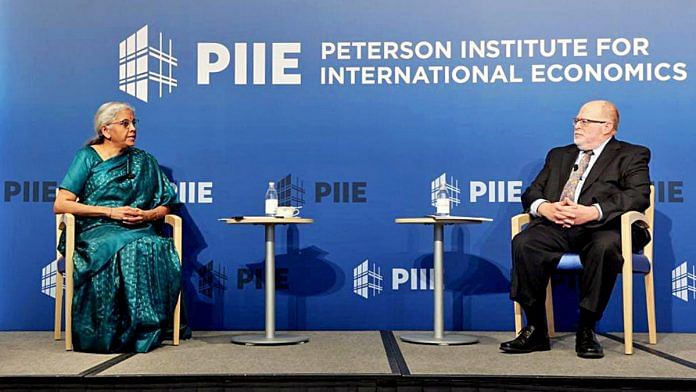New Delhi: At a time when questions are being raised about the status of the proposed Free Trade Agreement (FTA) between India and the UK, especially in light of pro-Khalistan demonstrations in London, Union finance minister Nirmala Sitharaman has reiterated that besides the UK, India is also pursuing separate FTAs with the European Union and Canada.
The finance minister was speaking Tuesday morning (Indian Standard Time) in Washington at the Peterson Institute for International Economics, a prominent American think-tank.
Sitharaman devoted a considerable portion of her discussion to India’s manufacturing and trade policies, highlighting that both are aimed at helping domestic manufacturers and facilitating partnerships with countries that are most feasible for India.
She also spoke out about how the World Trade Organization (WTO) — the inter-governmental regulator of international trade — should be “more progressive” and “fair to all members”.
“India has shown its initiative is working out well in pursuing with countries and agreeing to have FTAs with them,” Sitharaman said. “So, FTAs are being signed, in fact, far more speedily nowadays. We have just concluded one with Australia, an earlier one with UAE, Mauritius and we have had FTAs both in goods and services with ASEAN, with Korea, Japan.”
She added that FTAs on a bilateral and multilateral level have been the route India has followed since before 2014, and that this policy has quickened since 2019 with three major FTAs having been signed since.
“So we shall proceed in that route also with the UK, the EU and Canada,” Sitharaman said. “All three are happening now, as we speak. So we shall go in those preferential routes.”
Domestic market & PLI schemes
“Catering to the domestic market has become attractive for many of those producers who wouldn’t have produced such things that were otherwise available for cheap from outside,” Sitharaman explained.
To capture this changing momentum, the Indian government has come up with a phased manufacturing programme. Under the programme, the FM explained, several goods have been identified whose manufacturing and sale in India will initially be incentivised. Thereafter, these manufacturing capabilities would be moved to “more sophisticated” methods and supply chains with a view to export these goods.
“The other side is where you need to have value chains to come to India,” Sitharaman said. “To produce in India, not just for India, but to export from India, for which we have come up with the production-linked incentive (PLI) schemes.”
The finance minister in particular highlighted the PLI scheme in mobile manufacturing, saying that in 2014, India had nearly no mobile phone manufacturing capacity, whereas it is now the second-largest manufacturer of mobile phones in the world. “It is a signal that just tariffs aren’t going to be the way we protect our manufacturing,” she stated.
‘WTO needs to listen’: Sitharaman
Apart from expounding on how the domestic market was attractive and how the government was seeking to take advantage of this, Sitharaman also spoke at considerable length about how the WTO was no longer catering to the interests of smaller, less-developed countries, and how this needs to change.
“I would like the WTO to be a lot more progressive, a lot more listening to all countries, to be fair to all members,” she said. “It has to give more space to hear voices of countries which have something different to say and not just hear, but also somewhat heed because today’s message for the WTO should be to have greater openness.”
Sitharaman cited a speech made by US Secretary of Commerce Katherine Tai last week in which she questioned traditional approaches to issues like liberalisation of markets and what it actually means in terms of tariff reduction. “What exactly is this, how far is liberalisation, to what extent tariff reduction (should be done),” Sitharaman asked.
“We in India for all the less developed countries, the global South, if you would ask them, would have a similar opinion as the US Commerce Secretary.”
The finance minister further remarked, “How do you get your manufacturing back if you have to only constantly liberalise your market and implement tariff reductions.”
She did, however, reiterate that India has extended “quota-free, tariff-free” trade policies with least-developed countries that can make use of such agreements. “So any country, let’s say from Africa or anywhere else, the Pacific Islands or countries which are aspirational, low-income countries can export to India without any of these restrictions.”
However, previous liberal trade agreements have led to countries like India becoming “de-manufactured” as they have opened the country up to more efficient competitors to the detriment of domestic capabilities.
“Manufacturing abilities of communities have all gone for a toss, not just in India, but I suppose in many countries as well,” Sitharaman said, adding that this called for a re-look at trade agreements and overall policies which is what India is currently doing.
(Edited by Amrtansh Arora)
Also Read: Led by China, India, the 5 BRICS nations now contribute more to world GDP than industrialised G7



